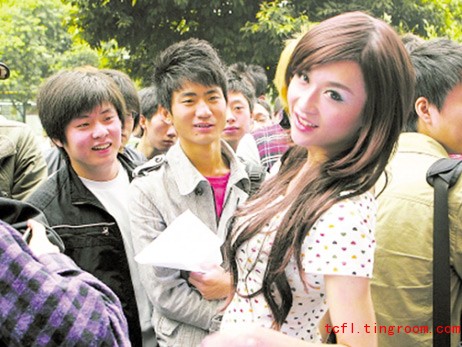pseudo-girl, or "weiniang" in Chinese

中文“伪娘”源自于日文“Nisemusume”一词,指的是长相清秀、穿着女性化的男子,常见于日本动漫中。
The word "weiniang" or "pseudo-girl" has entered Chinese from the Japanese word "Nisemusume," and refers to handsome boys who have a female appearance through their fashion style. The Japanese word is popularly used in comics and dramas.
但是,这些男子并非同性恋。
But the boys are not necessarily homosexuals.
这些女性装着的男子往往模糊了男女之间的界限,由此在国内引发了一番激烈的争论。
The "he" that dresses like a "she" and constantly blurs the lines of division between male and female has ignited a fierce debate in China.
一位来自四川省、名叫刘著的19岁男孩参加“快乐男生”之后一夜成名。“快乐男生”是个类似于“美国偶像”的选秀节目,只不过专门面向男性参赛选手展开;刘著迅速走红,不是因为他音色出众,而是得益于他那吸引眼球的女性着装(即“异装”)。
Liu Zhu, 19, from Sichuan Province, has risen to stardom overnight since he participated in "Happy Boys," China's all-male talent show equivalent to "American Idol," but he wasn't there for his vocal ability, but instead his cross-dressing performance in the competition.
海选试音时,刘著从着装、举止到言谈都酷似女生,以至于评委都对他的性别几度表示质疑。在那之后,他被当地媒体和网民冠以“伪娘”称号。
Auditioning for the show, Liu dressed, acted and spoke so femininely that the judges questioned his gender several times. Local media and netizens have hence nicknamed Liu a "nisemusume" or "pseudo girl."
在全球最大中文搜索引擎“百度”上,“刘著”这个名字的搜索量已超过1900万次,他的博客点击量也达到300万次。
His name returns more than 19 million hits on the leading Chinese search engine Baidu, while his blog has received 3 million hits.
在此之前的另一场选秀表演中,一个被称为“童童”的男孩(真名叫许龙)也因其女性装扮而一举成名。
In a previous talent show this year, Xu Long, a boy known as "Tongtong," also became famous because of his cross-dressing.
因为他们的出现,也因为他们带来的轰动效应,中文里诞生了这样一个专门术语——“伪娘”。
Thanks to them and the sensation they have created, there is a buzzword in China: "weiniang" or "pseudo-girl."
 English
English Japanese
Japanese Korean
Korean French
French German
German Spanish
Spanish Italian
Italian Arab
Arab Portuguese
Portuguese Vietnamese
Vietnamese Russian
Russian Finnish
Finnish Thai
Thai dk
dk